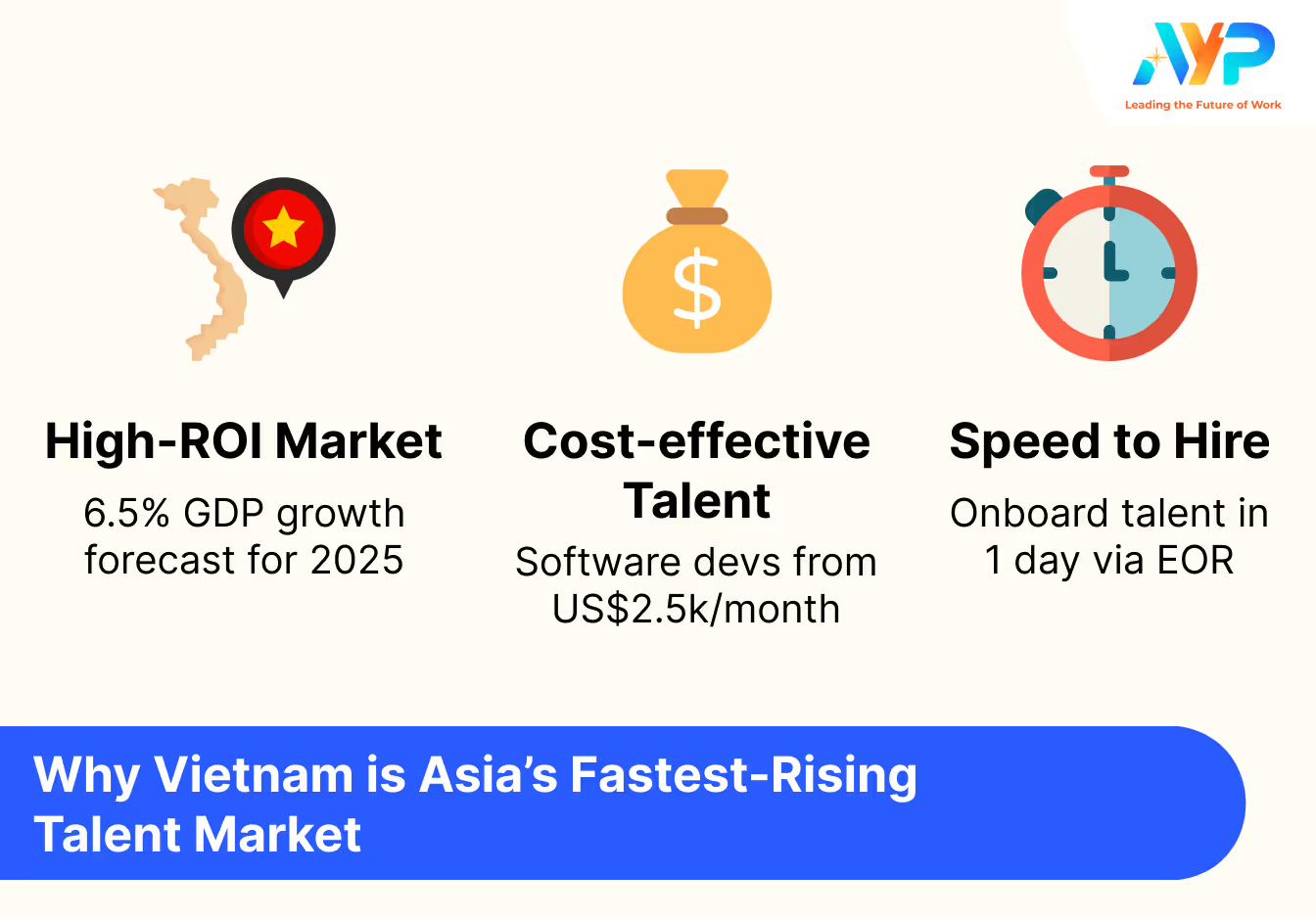BLOG |
Employer of Record & PEO
Published:
September 2, 2025
Last updated:
September 1, 2025


Expanding into Vietnam presents compelling opportunities—but also key challenges. With attractive growth, a young workforce, and ASEAN proximity, Vietnam is becoming a strategic hub for regional operations. Yet regulatory complexity, payroll compliance, and efficient talent acquisition often hold back companies. This guide—aligned with AYP Group's expertise—unpacks:
By the end, HR, sales and operations leaders will have a confident roadmap for hiring in Vietnam using compliant, cost-effective strategies.
Vietnam's GDP growth rate has averaged 6–7% annually over the past decade, with the World Bank projecting 6.5% growth in 2025—far outpacing many developed economies. Economic diversification across manufacturing, tech, and services continues to drive new demand for talent in B2B sectors, supply chain support, and software-enabled services.
Manufacturing & supply chain: With rising labour costs in China, Vietnam is gaining traction as a preferred manufacturing switchboard in Southeast Asia.
Digital services & IT: A young, digitally literate population (median age ~32) fosters local tech talent and growing software development hubs in cities like Ho Chi Minh and Da Nang.
Consumer B2B market: Rapid domestic growth opens regional sales channels for tech, finance, and logistics providers aiming to tap into Vietnam's urbanizing economy.
Key takeaway: Vietnam's accelerating growth and competitiveness mean fast-moving, high-impact expansion possibilities.
Vietnam's average income was around US$1,730 in 2024, with urban regions typically yielding 15–30% higher compensation (WorldData).
The national minimum wage in Vietnam ranges from ₫4.5 million to ₫7.0 million per month (~US$185–288), varying by region. Ho Chi Minh and Hanoi fall into the highest tier (Vietnam Government Decree 38/2022/NĐ-CP).
Beyond base salary, employers are responsible for mandatory contributions:
Additional expenses include paid leave, onboarding, and local recruitment fees. A comprehensive payroll and cost model—through our Vietnam professional employment services—enables realistic budgeting, full compliance, and operational visibility.
Pros:
Cons:
Pros:
Cons:
For companies focused on speed to market, professional employment services enable compliant onboarding within 24 hours, helping your team hit expansion milestones faster and without legal risk.
All employment contracts must:
Non-compliance with notice, severance, or contract terms can result in penalties or employment disputes, making accurate HR guidance essential.
1. Assess resource capacity
2. Define hiring goals
3. Compare entry options
4. Plan for compliance
5. Onboard talent
6. Monitor & scale
Companies looking to capture growth windows or pilot Vietnamese operations often prefer the professional employment model for its zero-delay hiring, scalable payroll compliance, and simplicity in exiting if needed.
Explore our Vietnam professional employment services to see how we support your business with onboarding, benefits, and ongoing payroll management.
A regional SaaS provider entered Vietnam to establish a local development team. By using the professional employment model, they were able to:
After six months, they saw strong product localization results and chose to expand headcount through the same model while keeping their operations agile.
Vietnam's strong economic outlook, rising digital infrastructure, and competitive workforce offer an attractive pathway for companies expanding in Asia. Whether you're targeting a lean test market entry or long-term strategic growth, the right setup—backed by compliant hiring and payroll—will define your success.
Ready to hire in Vietnam?
👉 Speak to a professional employment expert today and take your Vietnam hiring plans forward with speed and confidence.